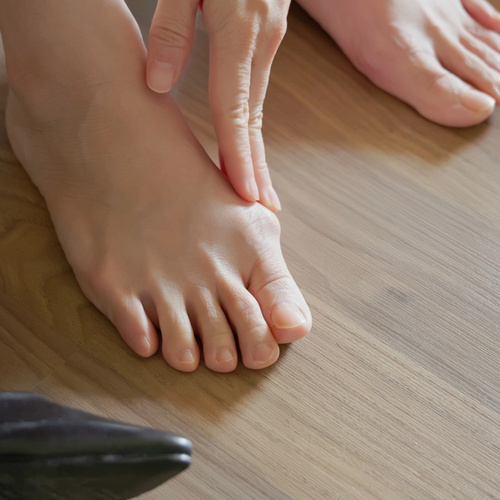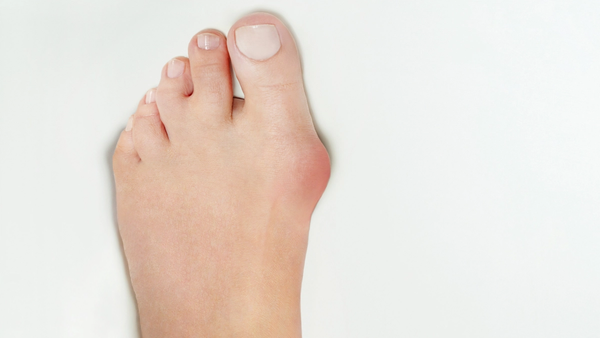Hallux valgus
Hallux valgus is a condition affecting the joint of the big toe, causing it to deviate towards the other toes. This often arises due to genetics, tight footwear, and misalignments. Prolonged use of unsuitable shoes can exacerbate the condition. Pain and swelling may increase after activity and prolonged walking. Early treatment and appropriate footwear can help alleviate discomfort associated with hallux valgus.
At Dr. Dropin, we have skilled practitioners who can assess your foot pain and help you receive the appropriate treatment.
See availability
What are you looking for?
Symptoms of hallux valgus
If you have hallux valgus, you may experience symptoms such as:
- Misalignment and pain in the joint of the big toe, with an angle towards the other toes.
- Tenderness and swelling at the base of the big toe, coupled with difficulty finding suitable footwear due to changes in shape, are common.
- Increasing pain with prolonged walking or wearing tight shoes.
Hallux valgus is a condition that develops gradually, and the intensity of symptoms can vary. Seeking professional guidance for an accurate diagnosis and appropriate treatment is essential if you are experiencing these symptoms.

Treatment
The treatment of hallux valgus involves a comprehensive approach. Common methods include pain relief through manual techniques to alleviate discomfort in the big toe.
Simultaneously, there is a focus on targeted stretching to improve foot mobility, while gradual strength training is introduced to reduce the strain on the affected joint.
Biomechanical evaluation, analysis of walking patterns, and potential adjustments to footwear or orthopedic insoles help decrease stress on the big toe.
Functional rehabilitation aims to gradually resume daily activities to restore optimal foot function.
It's crucial to understand that the treatment of hallux valgus should be tailored to individual needs, and collaboration with an experienced physiotherapist or chiropractor is essential to develop an effective and personalized treatment plan.
See availabilityWhen should you book an appointment?
If you recognize the symptoms above and are experiencing any of the following issues, we recommend seeking professional guidance:
- Pain or reduced mobility that has persisted for more than a week without improvement.
- Severe symptoms that you need assistance in reducing quickly.
- Symptoms that cause you concern or that you believe may be due to more serious conditions.
Remember that early assistance from a therapist can reduce the duration of your issues and contribute to achieving the best possible outcome. You should never worry that your problems are "too small" - we take all types of issues seriously.
See availability
Do you want guidance to find out which treatment suits you best?

Telephone
Authorized healthcare personnel assist you over the phone. We answer the phone within 60 seconds. Free of charge.

Find therapist
Find a therapist that suits you and your needs by filtering on one or more criteria.
Use your health insurance
We cooperate with all the major insurance companies, so that you can use your health insurance with us if you have foot pain or other problems.
Read more about how to use your health insurance here
What can you do by yourself?
While treatment for hallux valgus typically involves professional guidance and therapy, there are several measures you can take to alleviate symptoms and improve the condition.
- It's important to follow the recommended exercises provided by your therapist and perform them regularly.
- Adapt your activities to avoid situations that may lead to prolonged worsening of pain in the big toe.
- Pain relief can be achieved through the use of an ice pack, heat pad, a warm shower, or by engaging in gentle movements.
- Over-the-counter pain relievers can also be used as directed by healthcare professionals.
If you haven't had the condition examined yet or have deviated from the treatment plan, it is advisable to seek further guidance from healthcare professionals.
Frequently asked questions about hallux valgus
How to prevent hallux valgus?
Prevention includes wearing proper footwear, avoiding tight shoes, and strengthening foot muscles through exercises.
How to prevent hallux valgus?
Prevention includes wearing proper footwear, avoiding tight shoes, and strengthening foot muscles through exercises.
Is hallux valgus painful?
Hallux valgus can cause pain, especially during walking or when wearing tight shoes.
Is hallux valgus painful?
Hallux valgus can cause pain, especially during walking or when wearing tight shoes.
Can hallux valgus develop gradually, or does it occur suddenly?
Hallux valgus typically develops gradually over time, but some individuals may experience sudden changes.
Can hallux valgus develop gradually, or does it occur suddenly?
Hallux valgus typically develops gradually over time, but some individuals may experience sudden changes.